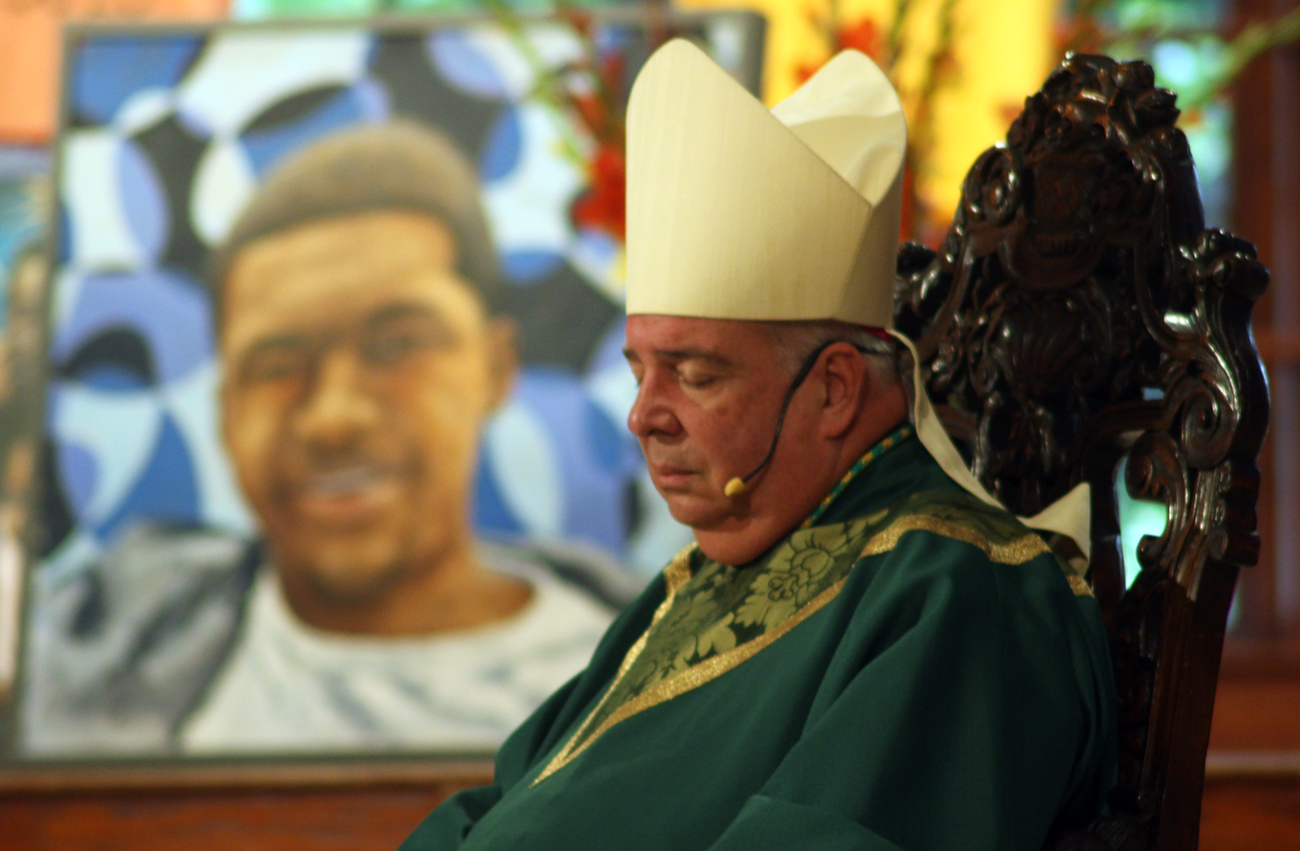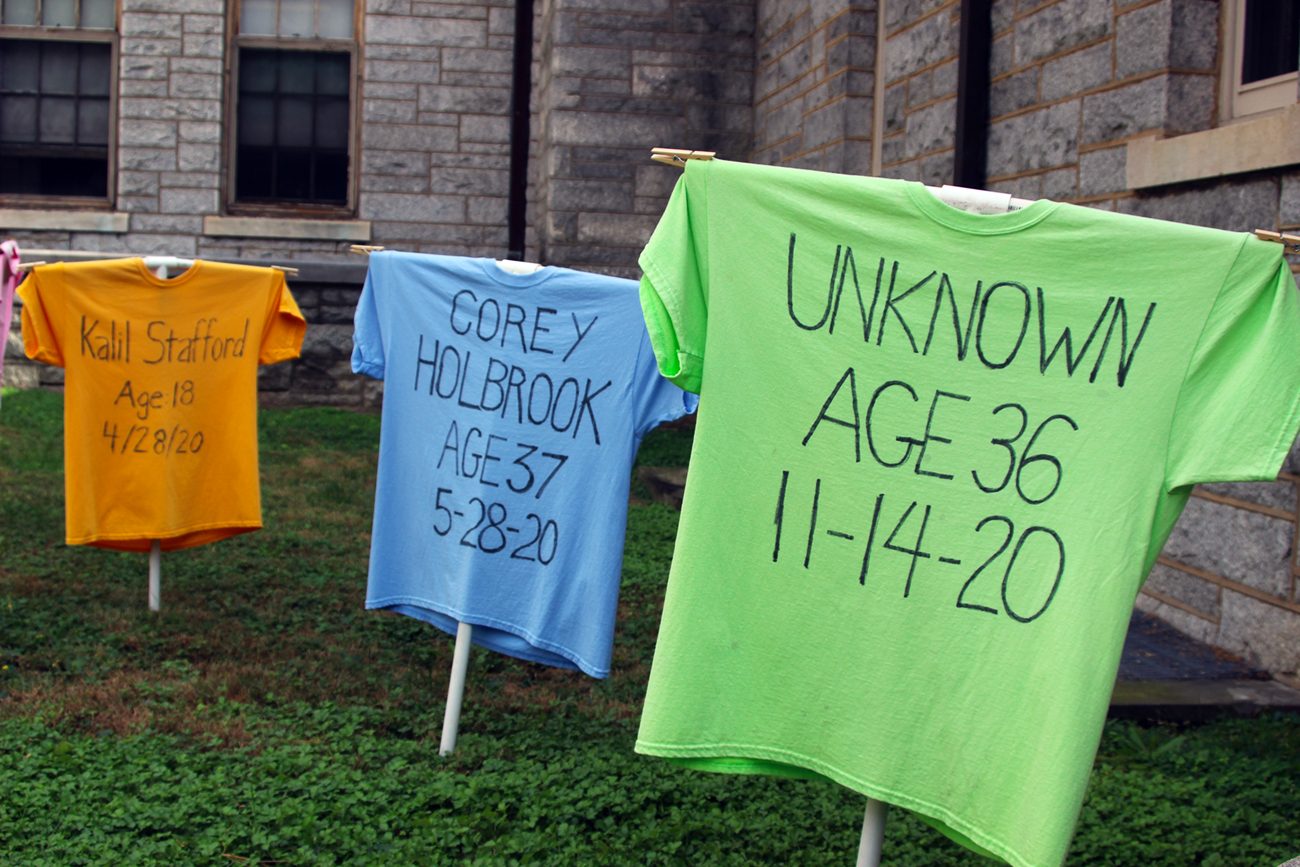Ending gun violence is a “simple but complex” challenge requiring “a transformation of the human spirit” by God that takes place gradually, said Archbishop Nelson Pérez.
On Oct. 16, the archbishop celebrated a “Mass for Peace and Justice” at Chestnut Hill College (CHC) to honor lives lost to gun violence, now at record levels in Philadelphia.
So far, the city has counted 435 homicides in 2021, with 375 fatal and 1,482 nonfatal shooting victims.
[hotblock]
Attended by some 130 Catholic and interfaith participants, Saturday’s liturgy was organized by CHC’s Institute for Forgiveness and Reconciliation (IFR) as part of its “Month of Nonviolence” observance. Founded in 2009, the institute works through scholarship, formation and outreach to promote interpersonal healing at the local and global levels.
Surrounding the altar at the Mass were several T-shirts from the Philadelphia Memorial to the Lost, each representing a gun violence victim in the city last year. The collection is one of several created by the non-profit Heeding God’s Call to End Gun Violence, whose executive director Bryan Miller lost his brother Michael, an FBI agent, during a 1994 ambush at Washington, D.C. police headquarters.
Also on display during the liturgy were several paintings of victims courtesy of the Souls Shot Portrait Project, which artistically commemorates individuals killed by gunfire.
“Behind these portraits is a life,” said Archbishop Pérez. “It’s a family … suffering (that) absence. … And they will suffer that for the rest of their lives.”
First-year CHC student Anastasia Watson, who served as lector for the Mass, said it was important to remember victims as individuals, not statistics.

Archbishop Nelson Pérez prays silently during an Oct. 16 Mass for peace and justice at Chestnut Hill College, at which portraits of gun violence victims — such as an image of Armand Fennell, painted by Rusty Eveland (background) — were displayed. (Gina Christian)
“Each of them has a name, each of them has a face, each of them has a story,” said Watson.
The gun violence crisis shows “life has become cheap across the spectrum,” said the archbishop, from “10,000 abortions … performed in one place in Center City every year” to rising numbers of shooting victims.
The archbishop said gun violence was a day-to-day reality of his two decades as a priest in North Philadelphia.
When assigned to the former St. Hugh of Cluny Parish, then-Father Pérez was told to “count the gunshots” so he could report the number to police. He also “buried dozens and dozens and dozens of young people … killed for one reason or another,” he said — including two young men who had slain each other during a drug deal.
In her welcoming remarks, IFR director and Sister of St. Joseph Cathy Nerney said those who work to counter gun violence “are God’s instruments to bring justice and healing, peace and forgiveness to the streets of our city” by overcoming “hatred with love, evil with good (and) violence with the graced choice to forgive.”
[hotblock2]
At the same time, there are “no easy answers” to the “pandemic” of gun violence, said the archbishop, and “there might not be one thing that we do that takes care of it all.”
However, he said, “people of faith” can stem the deadly trend of gun violence through collaboration, prayer, advocacy and “(lifting) up prophetic voices.”
While many secular organizations are working to stop the bullets, said Miller, “the missing component in gun violence prevention is the faith community.”
“If you look at American history and national social movements for change – whether the issue is slavery, civil rights, unions, suffrage – the faith community has led all those efforts,” he said. “But that’s not true for gun violence; the faith community is relatively absent. So one of our most important goals is to in some way begin to energize the American faith community as much as we can.”
The task can be both daunting and discouraging, admitted Archbishop Pérez, but those involved should believe in “the power of small beginnings and small steps.”
Just as Christ likened the kingdom of God to seeds that were scattered extravagantly and grew silently, the fruits of peacemaking develop gradually, said the archbishop.
While a Philadelphia priest, he had for a time counseled a young woman who found herself battling drug and alcohol addiction as a single mother. Years later, she contacted him to advise she had earned her doctorate.
“I didn’t see it happen, and I don’t even know what happened,” said the archbishop. “You never know how what you do will change a life, and when you change that one life, you actually change a whole trajectory.”
Watson agreed, saying she was “very hopeful” progress would be made in addressing gun violence.
“If we have love in our hearts, we can do anything,” she said.
PREVIOUS: Pro-life advocates rally against ‘Black genocide’ through abortion
NEXT: Young adults ‘connect, grow and share’ faith to reach others



Share this story